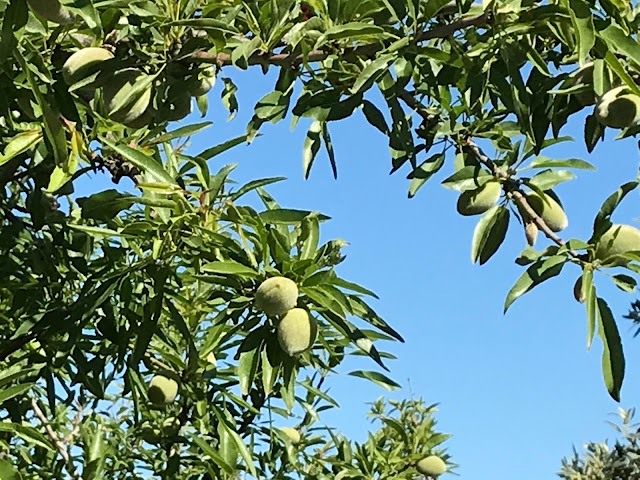We arrived in Sicily on
a cloudless spring day, sailing in to Porto Empedocle, a town named for the
ancient philosopher, Empedocles. He was reportedly a very wise fellow who, when
there was great sickness on the island, advised cutting a hole through the mountain
so the evil air could flow away to the sea. For someone who didn’t know
anything about airborne illness, it wasn’t a bad idea.
Today, we set off on an
exploration of the Valley of Temples with our guide Carmelina, a very
informative young lady who lived in New Jersey until she was twelve, so her
English was excellent. The Valley is a significant archaeological site with
several different temples constructed from 510 BC to 430 BC. Now, sadly, they
are in various stages of decay, but still very impressive.
Carmelina arranged the
tour to start with a slight climb up to the Temple of Hera (which may or may
not have been dedicated to Zeus’s head wife, but that’s the name it’s been
given.) Much of the Doric columns forming the outer colonade are still intact.
They were made of limestone instead of marble, so over time, the embellishments
have worn away.
From the Temple of Hera,
we walked a gentle downward slope along the old city walls that had also been
used as a mausoleum. Instead of being buried below ground, the departed were
arranged in the fetal position and laid to rest in small hollowed out sections
of the wall. Over time, some of them wore away to form open “windows,” like the
one we’re standing in front of.
The Temple of Concord is
the best-preserved of the Doric temples. In fact, its image is used by UNESCO,
which has declared this area a World Heritage Site, as part of its logo. The
grounds are often the home of arts festivals and this statue of the fallen
Icarus is a permanent part of the site. (In case you’re not familiar with the
story of Icarus, he and his father, Daedalus, were imprisoned by the Minoan
king after they designed the labyrinth for him. Daedalus devised wings for them
to fly to freedom, but he warned his son against flying too high. Icarus didn’t
follow his father’s advice and the sun melted the wax holding the feathers on
his wings, sending him plummeting to earth.)
The reason this temple
is still mostly intact is that it was used by other religions as new people claimed
dominion over the area.
In addition to the historic
structures, we also saw some very ancient olive trees—about 700-800 years old
and still bearing olives!
There was also a large
grove of almond trees on the grounds.
We heard a couple of
different stories about the Temple of Jupiter (Zeus). According to the Princess
tour description, it was built to commemorate the city's victory over Carthage.
Carmelina told us it was destroyed by the army from Carthage. Either way, if it
had been completed, it would have been the largest in the ancient world.
The oldest is the Temple
of Hercules, of which, only 8 columns still stand. Those few are thanks to an Englishman named Hardcastle, who recognized the significance of the
site and put those 8 columns back together. Carmelina told us the reason the
temple had been destroyed in the first place was because the original columns
had a lead center which was pillaged for use in making weapons.
After our excursion, we
had a restful afternoon back on the Pacific Princess. I got a chance to spend
about an hour with Jane, our resident iPad expert, who managed to convince me
that my iPhone is not possessed by an evil spirit, after all.
Tomorrow is another sea
day before we go to Pompeii and then, the crown jewel of the trip for me—Rome!







I loved Pompeii. Have a wonderful time.
ReplyDeleteWe will! Thanks, Jan.
DeleteYou are in your element & having a fantastic time. You & Brian look Great! My , those old temples were impressive. I loved the old olive tree! I can`t believe it still produces olives!!! Love you both
ReplyDeleteWe love you too, Mom. Miss you all so much, but we are having the time of our lives!
Delete